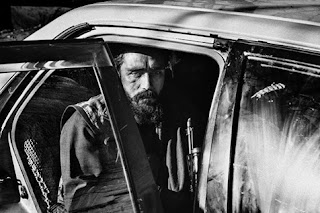First, I must state how much I enjoy my civilian life now - its been two years already and I am still giddy with joy that I have managed to escape slavery on the cruise ships and finally got out of the hamster's wheel - people think its glamorous life but in reality its everything but. Instead of working seven days a week and wasting my precious "free time" on trainings, drills and whatnot, I am now actually able to have work & private life separated. Work is work, than I switch off. And as Corona epidemics seems to have subdued here, now I am enjoying my walks, cinemas and yes, dear reader, exhibitions.
I was walking somewhere (probably hunting for a specific brand of Sangria), minding my own business and humming along, when this poster caught my attention. Some spectacular creature in a food market, totally crazy. Like Carmen Miranda out of place. I thought it was brilliant and actually took a double take, walked back to see it better. Right than and there I decided this would be interesting gift for my friend Ricardo who appears slightly more civilised than my co-workers, so he was invited for a surprise, as I often do. Poor guy suffered trough some bizarre cinema choices with me and never complained, but now I thought enough is enough and before he starts thinking I am some horror freak, lets see photo exhibition of what I assumed must be the best photos of the year. You know, twilights in Andes, lake in China, magic forrest in Germany and such. I am really naive sometimes.
So we came to this exhibition, which mind you is situated in a spectacular place called De Nieuwe Kerk and its actual 15th century Gothic church used nowadays as a exhibition place. Everything around here is old & recycled so its not unusual to see an old butcher sign above what is now a hairdresser or a salt warehouse moonlighting as a luxurious hotel, still the idea of genuine ancient protestant church hosting exhibits about Muslims, Buddha and Sumatrans still gives me a kick - all those admirals and playwrights buried here would probably turn in their graves. So you have this incredibly pretty old space and super modern exhibitions somehow squeezed inside. Fine, after all, why not?
You can imagine my horror when instead of nice pictures of kitties, puppies and animals I have actually encountered award-winning photos of such happy subjects as protesters beaten by police, Indian girls mutilated as a punishment by their families, young racists, people crying on the cemeteries, African emigrants and Russian Chernobyl ladies - it was one horror after the other and I'm afraid Ricardo now definitely thinks I am some weirdo - mind you, photos were very gripping and provocative but definitely too much to take at once, kind of makes you to cut your wrists right than and there. There were some very interesting images by Italian photographer Lorenzo Tugnoli and I liked those the most. For some reason they spoke to me - he was photographing Middle East and there were some haunting images of Taliban soldiers that I found fascinating, because the Western world describes them as a terrorists but what I saw on the pictures was not that famous, notorious "otherness" but our basic, human tragedy - trough his lenses I could glimpse exhaustion, fear, hunger and uncertainty. Souls in pain. And suddenly here I am, standing in the middle of an old protestant church turned museum and feeling compassion for Talibans. Maybe its good that I came to visit, after all.









